Review for Blade of The Immortal: Volume 3
Introduction
What started out as a rather run of the mill, and unimpressive period action piece came to life in the second volume. Blade of the Immortal has turned out to be a slow burner, laying the groundwork by gradually developing its characters and letting the story unfurl with a measured pace. It's far more than just a hack and slash samurai show, as I thought it to be given the first volume. The second instalment actually enthused me with its surprisingly insightful character studies, and its consideration of the feelings and the motivations that go into revenge, and the effect that all this has on the people involved. I have been looking forward to this third volume, and MVM kick off their 2011 anime campaign by releasing the conclusion of the series. That may just be the sticking point though, because if there is anything that is going to extinguish a slow burner, it's a short episode count, and Blade of the Immortal has to wrap up its tale in just thirteen episodes. That's a lot of immortality to pack into just a small space of time.
Manji was a badass Samurai who gave no quarter, and ruthlessly followed his liege lord's orders in battle, and in enforcing the law. Of course, his liege lord was corrupt and unprincipled, which meant that Manji's victims were mostly innocent men. A reputation of a killer of 100 honest men tends to wear on a man, which is why he wound up killing his master, then committing the sin of not committing ritual suicide in shame, and instead killing the man who tried to arrest him, who just happened to be his brother-in-law. Naturally this drove his sister Machi insane. His reward… a nun placed sacred bloodworms into his body that instantly heal any wound, no matter how grievous. Manji is immortal, with a whole lot of vengeful relatives and friends looking for him. It isn't long before he tires of immortality, and decides that if he kills 1000 evil men, then he will be redeemed, and allowed to die…
The four concluding episodes of Blade of the Immortal are presented on this disc by MVM.
10. Mask of Change
A festival would seem a nice time to relax, but it doesn't seem too advisable given that the Itto-Ryu want Manji and Rin dead with some degree of alacrity. It's not even as if Manji is a festival kind of guy, even if Rin is trying to get his attention by buying a new brooch. At the festival, Rin bumps into a precocious boy named Renzo while trying to buy some snacks. At the same time, Manji meets a very interesting mask maker, who can do wonders with a sword, and is happy to use blood when he runs out of paint for his masks. The mask maker and Renzo are father and son, and when Rin rescues Renzo from a particularly belligerent samurai, you'd think that the father would be grateful. But the mask maker is Kawakami Araya, the Itto-Ryu member that raped Rin's mother in front of her.
11. Wings
Rin is more conflicted than ever. Kawakami appears to have put his past behind him, he's settled down to be a loving father to his son, and if Rin kills him, she'll be continuing the same cycle of revenge, with Renzo seeing her the same way as she views his father. Renzo has even invited her to his house, and his father is all too grateful for her help in protecting his son. It looks as if Kawakami doesn't even remember her. He certainly hasn't told his son of his murderous past. Rin decides to alter her revenge, decides to demand an apology from the man who ruined her life. But that could be a big mistake, as Kawakami now has a happy family life, and a lie that he will kill to protect.
12. Wheel
With Rin depressed by the recent turn of events, and wavering when it comes to her goal of revenge, Manji decides to take her into the hills for some training, to help her refocus and decide if she really wants to continue with her mission. At the same time Kagehisa Anotsu of the Itto-ryu is facing a dilemma as well, with the appearance of another group that espouses the same goals as his. Tai advises him to get some space to sort his mind out, and swing a sword until he reaches clarity of purpose. Which is how Rin comes face to face with the killer of her parents once more. But this time, Kagehisa will tell her just why her family died.
13. Wind
The conclusion?
Picture
Blade of the Immortal gets the by now de rigueur 1.78:1 anamorphic NTSC-PAL transfer, which fortunately is one of the good ones. It's low on compression artefacts, ghosting and judder is minimal, and the anime comes across to good effect. The animation comes from studios BEETRAIN and Production I.G. and if you have seen other BEETRAIN shows like Madlax and Tsubasa, then you should find the quality of the animation familiar, and to a lesser degree the style as well. The character designs are consistent and very pleasing to the eye, tending to more realistic appearances. The world designs are similarly of high quality, while the actual animation is fluid and energetic, with a decent amount of attention paid to the action sequences. My problem is that it's almost too pretty an animation for the subject material. The muted pastel colours, the elegant cleanliness of the animation, and the stylised moments seem incongruous with the grittiness and the nastiness of the story.
Sound
The usual choice between DD 2.0 English and Japanese, along with optional translated subtitles or a signs only track here. The Japanese track is certainly very attractive, with the cast list looking like a who's who of Japanese voice actors. From what little I sampled of the English dub, it sounded very average, but no doubt dub aficionados will have a more considered opinion than I. The dialogue is clear though, and the show gets some suitably effective music, as well as a couple of quirky theme songs.
Extras
Blade of the Immortal gets a static menu and jacket picture when the disc isn't spinning. On the disc you'll find the textless credits, and trailers for Mahoromatic: Automatic Maiden and Fate/Stay Night.
This final disc certainly doesn't skimp on the extras though, gathering another two of the Japanese featurettes. First is the final instalment of the Samura chats, where manga creator Hiroaki Samura joins series director Koichi Mashimo for a meet, greet and eat, as well as a chat about the show, and anime in general. It's an insightful look into the production process, and the history of anime, with mention made of the explosion in production that has come with the move away from film to CG. Just when the conversation begins to flag, Chief Writer Hiroyuki Kawasaki, and Animation Producer Hideaki Muruoka join them. This featurette lasts 41 minutes, and well worth noting is the apology for the ending, and the hope for a second season.
Finally there is a trip back to the fourth instalment of the featurettes, a 29-minute sit down chat with Screen Writer Hiroyuki Kawasaki, who this time isn't quite as frivolous. It also provides a look inside the lair of an otaku. It could have been a rather tense interview, the creator of a manga meeting the man who has to adapt it to screen (often where much is lost in translation), but the two are more simpatico, and this turns out to be another interesting and informative chat.
Conclusion
Blade of the Immortal has to be the most frustrating experience with an anime that I have had in quite a while, and that comes from someone who has only recently watched Kurau Phantom Memory. That was frustrating because it just didn't provoke any enthusiasm in me. Blade of the Immortal is quite the reverse, and I find that I have a lot to be enthusiastic about with this show. It looks great, the storytelling is compelling, and it is generally well written. It also has some of the best characterisations when it comes to depth, thought, and empathy that I have seen in this medium. What's frustrating is that it's only a thirteen episode series. What's frustrating is that it tells its story at a leisurely, gradual pace, to allow for that enthralling character development. What's frustrating is that the first volume of five episodes didn't help me to realise that, and I would have dismissed this show out of hand were it not for the second volume. What's frustrating is that in this volume, the story builds to a dramatic crescendo, getting better and better along the way, and then lets the side down with a final episode that is a narrative mess, a blatant demand for a continuation of the series to resolve all these new storylines that have suddenly appeared. What's frustrating is that there is no second series to Blade of the Immortal, and that this is all that we get.
The immortal Manji takes something of a back seat in these episodes, which is no bad thing really, as the narrative thrust of this series has really been on Rin and her search for vengeance. That vengeance comes under the microscope in the first three episodes on this disc, as Rin is forced time and again to face the consequences of her choices. The first time is in the first two episodes, as she finally meets Kawakami Araya, the man who defiled Rin's mother. What's interesting here is that Kawakami has put that life behind him, is settled down, and is raising a son. As it happens, Rin meets Renzo first, and the two become sort of friends. The questions then arise over whether she should continue her quest for revenge. If Kawakami has renounced his past life, doesn't that make him worthy of forgiveness? If he is part of a community, a loving father, someone who loves children, what does she gain by revealing his sordid past? And if she orphans his son, won't she be perpetuating the circle of hatred, wouldn't Renzo in turn be propelled into seeking revenge against her in return? That in the end Kawakami takes the choice from her is almost irrelevant, as Blade of the Immortal's strength is that it allows its characters to face the dilemma, and be moved by it. You see the process and the agonies that they go through as they search their souls for answers, and their torment when answers aren't forthcoming.
There are no easy answers in the third episode, and there's no last minute reprieve for Rin either. She has to face Kagehisa Anotsu at last, the leader of the Itto-ryu, and the man directly responsible for the murder of her parents. But once again, this isn't a simple matter of kill or be killed. Kagehisa takes the time out to explain just why he had to kill her parents, and what's worse is that she comes to understand his reasoning. It's why there is no easy death for either of them, and it's why when she looks at him, it's like looking at a distorted mirror. She has to examine her own motivations and reasoning, and the answers that she finds cause her more torment than she can handle. It's down to Manji to help her find her centre and focus again, but this is no longer just a simple mission of revenge.
This probably would have been the best place to end the series, as while it isn't the end of the story, it certainly feels like the end of a chapter, the closing of an arc, with Rin's confrontation with Anotsu certainly a dramatic peak. Having her come to terms with developments, and decide whether or not to continue her quest, is a decent place to leave the story, even with the hope that there would be a second series. But Blade of the Immortal has to have one final bite of the cherry, and the final episode is almost as random and chaotic as the first episode. There is a lot going on here, plenty of threads being spun, a lot of characters being revisited, and what looks like a whole new series of story arcs commencing. It isn't as bad as the opening episode, in that at least we now know whom these characters are, and have some inkling of what the events occurring mean. But for the same reasoning, it's worse, as we now have a whole heap of cliff-hangers that just won't be resolved, instead of just the one dangling storyline had we concluded one episode earlier.
Here's an oxymoron for you, Blade of the Immortal is the best disappointment that you can have in anime. It's a great story, with compelling characters, told with panache, but it's over before it can even get started, and the ending is as damp a squib as you can get. Should you invest in this series? Personally, I'd much rather have a Blade of the Immortal, which aims impossibly high and fails, in some ways quite spectacularly, than a series more mundane, which aims low and just does enough to keep the engine ticking over, for episodes on end. If you can handle the inevitable disappointment, then go buy Blade of the Immortal. It goes nowhere, but it gives you one hell of a ride!
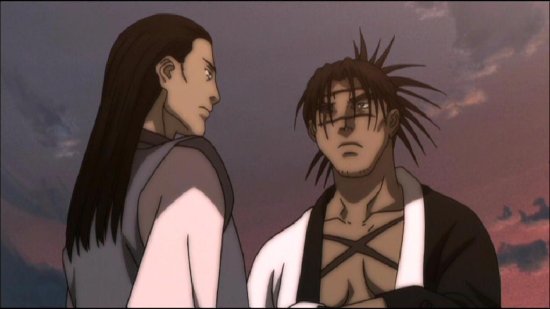
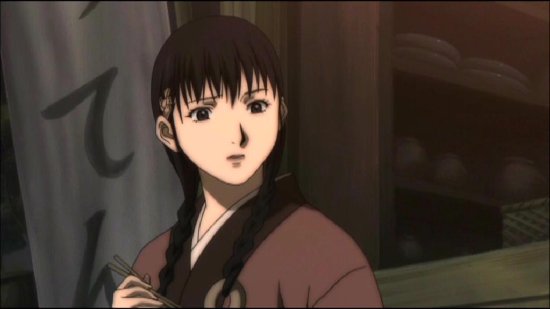
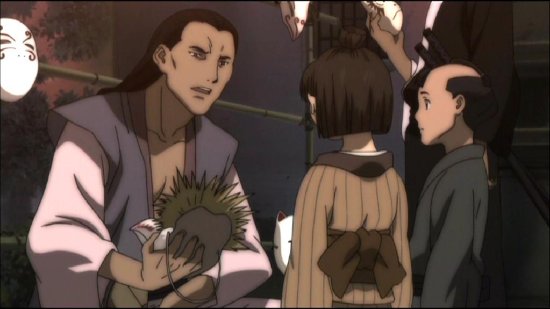
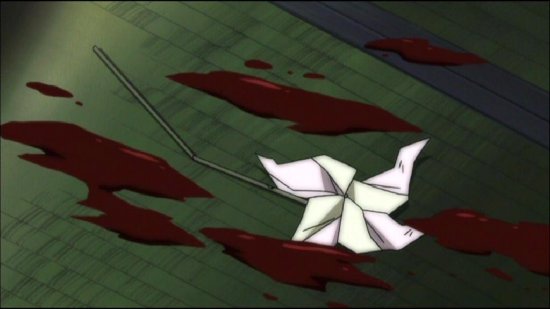
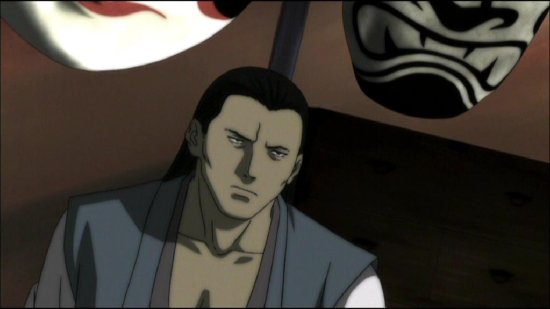
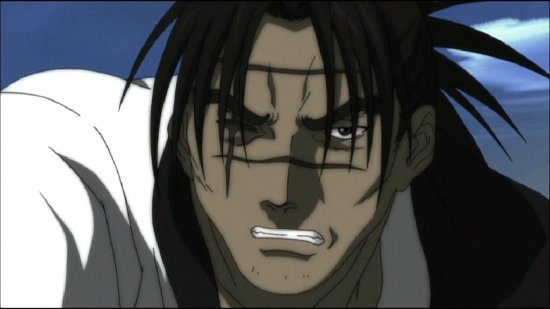
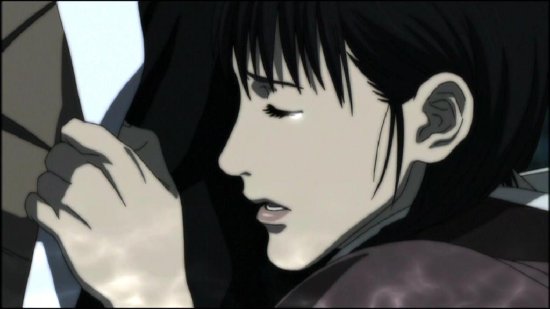
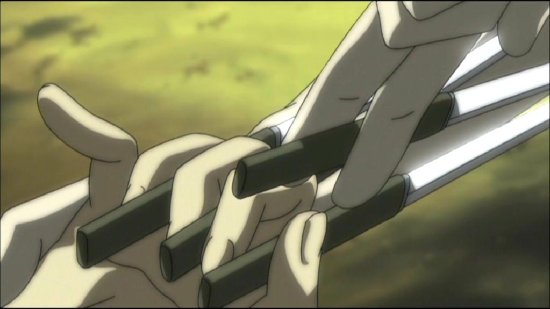
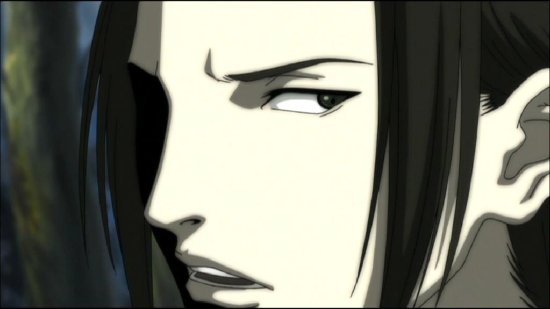
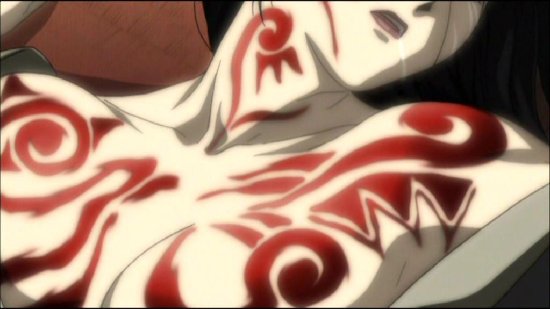
Your Opinions and Comments
Be the first to post a comment!